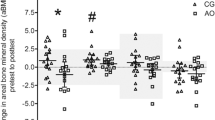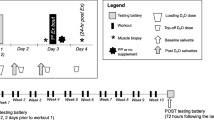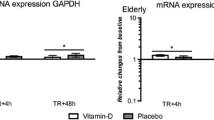Abstract
Purpose
Vitamin D (Vit-D) supplementation has been shown to increased muscle strength in young adults. It remains unclear if Vit-D supplementation enhances the efficacy of resistance training (RT). This study tested the hypothesis that Vit-D supplementation would enhance the RT-induced increases in muscle strength and lean body mass (LBM) in Vit-D deficient young men.
Methods
Thirty-nine men (baseline serum 25(OH)D < 50 nmol L‒1) were quasi-randomly assigned to one of the two groups that performed a 12-week supervised RT program concomitant with either Vit-D (8000 IU daily; VD) or placebo (PLC) supplementation.
Results
During 12-week RT, energy and nutrient (except Vit-D) intake and training loads did not differ in the two groups. Serum 25(OH)D levels increased from 36.3 ± 9.2 to 142.4 ± 21.9 nmol L‒1 (P < 0.05) in VD group and remained unchanged between 36.3 ± 8.9 and 29.4 ± 6.6 nmol L‒1 (P > 0.05) in PLC group. Muscle strength (1-repetition maximum) increased (P < 0.05) to an equal extent in the two groups in 5 exercises performed on RT equipment, whereas strength gains in chest press and seated row were greater (P < 0.05) in PLC compared to VD group. Total and regional LBM (measured by DXA scan) increased (P < 0.05) equally in the two groups. Android fat mass decreased (P < 0.05) in VD group only.
Conclusion
Vit-D supplementation does not enhance the efficacy of RT in terms of muscle strength and LBM gains in Vit-D deficient young healthy men.



Similar content being viewed by others
Abbreviations
- ANOVA:
-
Analysis of variance
- BM:
-
Body mass
- BMI:
-
Body mass index
- CK:
-
Creatine kinase
- GH:
-
Growth hormone
- IGF-1:
-
Insulin-like growth factor-1
- LBM:
-
Lean body mass
- PLC:
-
Placebo group
- PTH:
-
Parathormone
- 1RM:
-
1-Repetition maximum
- 5RM:
-
5-Repetition maximum
- RT:
-
Resistance training
- VD:
-
Vitamin D group
- VDR:
-
Vitamin D receptor
- Vit-D:
-
Vitamin D
References
Abboud M, Puglisi DA, Davies BN et al (2013) Evidence for a specific uptake and retention mechanism for 25-hydroxyvitamin D (25OHD) in skeletal muscle cells. Endocrinology 154(9):3022–3030. https://doi.org/10.1210/en.2012-2245
Agergaard J, Trøstrup J, Uth J et al (2015) Does vitamin-D intake during resistance training improve the skeletal muscle hypertrophic and strength response in young and elderly men?—a randomized controlled trial. Nutr Metab (Lond) 12:32. https://doi.org/10.1186/s12986-015-0029-y
Ameri P, Giusti A, Boschetti M et al (2013) Vitamin D increases circulating IGF1 in adults: potential implication for the treatment of GH deficiency. Eur J Endocrinol 169(6):767–772. https://doi.org/10.1530/EJE-13-0510
Baechle TR, Earle RW, National Strength & Conditioning Association (US) (2008) Essentials of strength training and conditioning. Human Kinetics, Champaign, IL
Biolo G, Declan Fleming RY, Wolfe RR (1995) Physiologic hyperinsulinemia stimulates protein synthesis and enhances transport of selected amino acids in human skeletal muscle. J Clin Invest 95(2):811–819. https://doi.org/10.1172/JCI117731
Birge SJ, Haddad JG (1975) 25-hydroxycholecalciferol stimulation of muscle metabolism. J Clin Invest 56(5):1100–1107. https://doi.org/10.1172/JCI108184
Bislev LS, Langagergaard Rødbro L, Rolighed L, Sikjaer T, Rejnmark L (2018) Effects of vitamin D3 supplementation on muscle strength, mass, and physical performance in women with vitamin D insufficiency: a randomized placebo-controlled trial. Calcif Tissue Int 103(5):483–493. https://doi.org/10.1007/s00223-018-0443-z
Bodine SC, Stitt TN, Gonzalez M et al (2001) Akt/mTOR pathway is a crucial regulator of skeletal muscle hypertrophy and can prevent muscle atrophy in vivo. Nat Cell Biol 3(11):1014–1019. https://doi.org/10.1038/ncb1101-1014
Boland RL (2011) VDR activation of intracellular signaling pathways in skeletal muscle. Mol Cell Endocrinol 347(1–2):11–16. https://doi.org/10.1016/j.mce.2011.05.021
Burt LA, Billington ED, Rose MS, Raymond DA, Hanley DA, Boyd SK (2019) Effect of high-dose vitamin D supplementation on volumetric bone density and bone strength: a randomized clinical trial. JAMA 322(8):736–745. https://doi.org/10.1001/jama.2019.11889
Campos GER, Luecke TJ, Wendeln HK et al (2002) Muscular adaptations in response to three different resistance-training regimens: specificity of repetition maximum training zones. Eur J Appl Physiol 88(1–2):50–60. https://doi.org/10.1007/s00421-002-0681-6
Canguven O, Talib RA, El Ansari W, Yassin DJ, Al Naimi A (2017) Vitamin D treatment improves levels of sexual hormones, metabolic parameters and erectile function in middle-aged vitamin D deficient men. Aging Male 20(1):9–16. https://doi.org/10.1080/13685538.2016.1271783
Cannell JJ, Hollis BW (2008) Use of vitamin D in clinical practice. Altern Med Rev 13(1):6–20
Carrillo AE, Flynn MG, Pinkston C, Markofski MM, Jiang Y, Donkin SS, Teegarden D (2013) Impact of vitamin D supplementation during a resistance training intervention on body composition, muscle function, and glucose tolerance in overweight and obese adults. Clin Nutr 32(3):375–381. https://doi.org/10.1016/j.clnu.2012.08.014
Ceglia L, Niramitmahapanya S, da Silva MM et al (2013) A randomized study on the effect of vitamin D3 supplementation on skeletal muscle morphology and vitamin D receptor concentration in older women. J Clin Endocrinol Metab 98(12):E1927–E1935. https://doi.org/10.1210/jc.2013-2820
Damas F, Phillips SM, Libardi CA et al (2016) Resistance training-induced changes in integrated myofibrillar protein synthesis are related to hypertrophy only after attenuation of muscle damage. J Physiol 594(18):5209–5222. https://doi.org/10.1113/JP272472
EFSA Panel on Dietetic Products, Nutrition and Allergies (NDA) (2012) Scientific opinion on the tolerable upper intake level of vitamin D. EFSA J 10(7):2813. https://doi.org/10.2903/j.efsa.2012.2813
Gharahdaghi N, Rudrappa S, Brook MS et al (2019) Testosterone therapy induces molecular programming augmenting physiological adaptations to resistance exercise in older men. J Cachexia Sarcopenia Muscle 10(6):1276–1294. https://doi.org/10.1002/jcsm.12472
Girgis CM (2020) Vitamin D and skeletal muscle: emerging roles in development, anabolism and repair. Calcif Tissue Int 106(1):47–57. https://doi.org/10.1007/s00223-019-00583-4
Gonzalez AM (2016) Acute anabolic response and muscular adaptation after hypertrophy-style and strength-style resistance exercise. J Strength Cond Res 30(10):2959–2964. https://doi.org/10.1519/JSC.0000000000001378
Habib FK, Maddy SQ, Gelly KJ (1990) Characterisation of receptors for 1,25 dihydroxyvitamin D3 in the human testis. J Steroid Biochem 35(2):195–199. https://doi.org/10.1016/0022-4731(90)90274-v
Haddad F, Adams GR (2004) Inhibition of MAP/ERK kinase prevents IGF-I-induced hypertrophy in rat muscles. J Appl Physiol 96(1):203–210. https://doi.org/10.1152/japplphysiol.00856.2003
Haegens A, Schols AM, van Essen AL, van Loon LJ, Langen RC (2012) Leucine induces myofibrillar protein accretion in cultured skeletal muscle through mTOR dependent and -independent control of myosin heavy chain mRNA levels. Mol Nutr Food Res 56(5):741–752. https://doi.org/10.1002/mnfr.201100695
Häkkinen K, Pakarinen A (1994) Serum hormones and strength development during strength training in middle-aged and elderly males and females. Acta Physiol Scand 150(2):211–219. https://doi.org/10.1111/j.1748-1716.1994.tb09678.x
Hayakawa N, Fukumura J, Yasuno H, Fujimoto-Ouchi K, Kitamura H (2015) 1α25(OH)2D3 downregulates gene expression levels of muscle ubiquitin ligases MAFbx and MuRF1 in human myotubes. Biomed Res 36(2):71–80. https://doi.org/10.2220/biomedres.36.71
Heaney RP (2011) Assessing vitamin D status. Curr Opin Clin Nutr Metab Care 14(5):440–444. https://doi.org/10.1097/MCO.0b013e328348ed85
Heaney RP, Davies KM, Chen TC, Holick MF, Barger-Lux MJ (2003) Human serum 25-hydroxycholecalciferol response to extended oral dosing with cholecalciferol. Am J Clin Nutr 77(1):204–210. https://doi.org/10.1093/ajcn/77.1.204
Holick MF, Binkley NC, Bischoff-Ferrari HA et al (2011) Evaluation, treatment, and prevention of vitamin D deficiency: an Endocrine Society clinical practice guideline. J Clin Endocrinol Metab 96(7):1911–1930. https://doi.org/10.1210/jc.2011-0385
Hulmi JJ, Laakso M, Mero AA, Häkkinen K, Ahtiainen JP, Peltonen H (2015) The effects of whey protein with or without carbohydrates on resistance training adaptations. J Int Soc Sports Nutr 12:48. https://doi.org/10.1186/s12970-015-0109-4
Jäger R, Kerksick CM, Campbell BI et al (2017) International Society of Sports Nutrition position stand: protein and exercise. J Int Soc Sports Nutr 14:20. https://doi.org/10.1186/s12970-017-0177-8
Kraemer WJ, Hatfield DL, Volek JS et al (2009) Effects of amino acids supplement on physiological adaptations to resistance training. Med Sci Sports Exerc 41(5):1111–1121. https://doi.org/10.1249/MSS.0b013e318194cc75
Kvorning T, Andersen M, Brixen K, Madsen K (2006) Suppression of endogenous testosterone production attenuates the response to strength training: a randomized, placebo-controlled, and blinded intervention study. Am J Physiol Endocrinol Metab 291(6):E1325–E1332. https://doi.org/10.1152/ajpendo.00143.2006
Lafranco F, Minetto MA (2013) The male reproductive system, exercise, and training: endocrine adaptations. In: Constantini N, Hackney AC (eds) Endocrinology of physical activity and sport, 2nd edn. Springer Science+Business Media, New York, pp 121–132
Larson-Meyer DE, Willis KS (2010) Vitamin D and athletes. Curr Sports Med Rep 9(4):220–226. https://doi.org/10.1249/JSR.0b013e3181e7dd45
Levinger I, Goodman C, Hare DL, Jerums G, Toia D, Selig S (2009) The reliability of the 1RM strength test for untrained middle-aged individuals. J Sci Med Sport 12(2):310–316. https://doi.org/10.1016/j.jsams.2007.10.007
Lips P, Eekhoff M, van Schoor N, Oosterwerff M, de Jongh R, Krul-Poel Y, Simsek S (2017) Vitamin D and type 2 diabetes. J Steroid Biochem Mol Biol 173:280–285. https://doi.org/10.1016/j.jsbmb.2016.11.021
Macnaughton LS, Wardle SL, Witard OC et al (2016) The response of muscle protein synthesis following whole-body resistance exercise is greater following 40 g than 20 g of ingested whey protein. Physiol Rep 4(15):e12893. https://doi.org/10.14814/phy2.12893
Marantes I, Achenbach SJ, Atkinson EJ, Khosla S, Melton LJ, Amin S (2011) Is vitamin D a determinant of muscle mass and strength? J Bone Miner Res 26(12):2860–2871. https://doi.org/10.1002/jbmr.510
Marwaha RK, Garg MK, Gupta S et al (2018) Association of insulin-like growth factor-1 and IGF binding protein-3 with 25-hydroxy vitamin D in pre-pubertal and adolescent Indian girls. J Pediatr Endocrinol Metab 31(3):289–295. https://doi.org/10.1515/jpem-2017-0275
Mason C, Tapsoba JD, Duggan C, Imayama I, Wang CY, Korde L, McTiernan A (2016) Effects of vitamin D3 supplementation on lean mass, muscle strength and bone mineral density during weight loss: a double-blind randomized controlled trial. J Am Geriatr Soc 64(4):769–778. https://doi.org/10.1111/jgs.14049
Mason RS, Rybchyn MS, Abboud M, Brennan-Speranza TC, Fraser DR (2019) The role of skeletal muscle in maintaining vitamin D status in winter. Curr Dev Nutr 3(10):nzz087. https://doi.org/10.1093/cdn/nzz087
Moore DR, Del Bel NC, Nizi KI, Hartman JW, Tang JE, Armstrong D, Phillips SM (2007) Resistance training reduces fasted- and fed-state leucine turnover and increases dietary nitrogen retention in previously untrained young men. J Nutr 137(4):985–991. https://doi.org/10.1093/jn/137.4.985
Moore DR, Robinson MJ, Fry JL et al (2009) Ingested protein dose response of muscle and albumin protein synthesis after resistance exercise in young men. Am J Clin Nutr 89(1):161–168. https://doi.org/10.3945/ajcn.2008.26401
Morton RW, Sato K, Gallaugher MPB, Oikawa SY, McNicholas PD, Fujita S, Phillips SM (2018) Muscle androgen receptor content but not systemic hormones is associated with resistance training-induced skeletal muscle hypertrophy in healthy, young men. Front Physiol 9:1373. https://doi.org/10.3389/fphys.2018.01373
Ogan D, Pritchett K (2013) Vitamin D and the athlete: risks, recommendations, and benefits. Nutrients 5:1856–1868. https://doi.org/10.3390/nu5061856
Ööpik V, Timpmann S, Rips L et al (2017) Anabolic adaptations occur in conscripts during basic military training despite high prevalence of vitamin D deficiency and decrease in iron status. Mil Med 182(3/4):e1810. https://doi.org/10.7205/MILMED-D-16-00113
Owens DJ, Webber D, Impey SG et al (2014) Vitamin D supplementation does not improve human skeletal muscle contractile properties in insufficient young males. Eur J Appl Physiol 114(6):1309–1320. https://doi.org/10.1007/s00421-014-2865-2
Owens DJ, Tang JC, Bradley WJ, Sparks AS, Fraser WD, Morton JP, Close GL (2017) Efficacy of high-dose vitamin D supplements for elite athletes. Med Sci Sports Exerc 49(2):349–356. https://doi.org/10.1249/MSS.0000000000001105
Phillips SM (2015) Nutritional supplements in support of resistance exercise to counter age-related sarcopenia. Adv Nutr 6(4):452–460. https://doi.org/10.3945/an.115.008367
Pilz S, Frisch S, Koertke H et al (2011) Effect of vitamin D supplementation on testosterone levels in men. Horm Metab Res 43(3):223–225. https://doi.org/10.1055/s-0030-1269854
Pludowski P, Holick MF, Grant WB et al (2018) Vitamin D supplementation guidelines. J Steroid Biochem Mol Biol 175:125–135. https://doi.org/10.1016/j.jsbmb.2017.01.021
Pojednic RM, Ceglia L (2014) The emerging biomolecular role of vitamin D in skeletal muscle. Exerc Sport Sci Rev 42(2):76–81. https://doi.org/10.1249/JES.0000000000000013
Poslusna K, Ruprich J, Vries JHM et al (2009) Misreporting of energy and micronutrient intake estimated by food records and 24 hour recalls, control and adjustment methods in practice. Br J Nutr 101(Suppl 2):S73–S85. https://doi.org/10.1017/S0007114509990602
Ravelli MN, Schoeller DA (2020) Traditional self-reported dietary instruments are prone to inaccuracies and new approaches are needed. Front Nutr 7:90. https://doi.org/10.3389/fnut.2020.00090
Rejnmark L, Bislev LS, Cashman KD et al (2017) Non-skeletal health effects of vitamin D supplementation: a systematic review on findings from meta-analyses summarizing trial data. PLoS ONE 12(7):e0180512. https://doi.org/10.1371/journal.pone.0180512
Romeu Montenegro K, Carlessi R, Cruzat V, Newsholme P (2019) Effects of vitamin D on primary human skeletal muscle cell proliferation, differentiation, protein synthesis and bioenergetics. J Steroid Biochem Mol Biol 193:105423. https://doi.org/10.1016/j.jsbmb.2019.105423
Rønnestad BR, Egeland W, Kvamme NH, Refsnes PE, Kadi F, Raastad T (2007) Dissimilar effects of one- and three-set strength training on strength and muscle mass gains in upper and lower body in untrained subjects. J Strength Cond Res 21(1):157–163. https://doi.org/10.1519/00124278-200702000-00028
Rønnestad BR, Nygaard H, Raastad T (2011) Physiological elevation of endogenous hormones results in superior strength training adaptation. Eur J Appl Physiol 111(9):2249–2259. https://doi.org/10.1007/s00421-011-1860-0
Ross AC, Manson JE, Abrams SA et al (2011) The 2011 report on dietary reference intakes for calcium and vitamin D from the Institute of Medicine: what clinicians need to know. J Clin Endocrinol Metab 96(1):53–58. https://doi.org/10.1210/jc.2010-2704
Rubin MR, Kraemer WJ, Maresh CM et al (2005) High-affinity growth hormone binding protein and acute heavy resistance exercise. Med Sci Sports Exerc 37(3):395–403. https://doi.org/10.1249/01.mss.0000155402.93987.c0
Salles J, Chanet A, Giraudet C et al (2013) 1,25(OH)2-vitamin D3 enhances the stimulating effect of leucine and insulin on protein synthesis rate through Akt/PKB and mTOR mediated pathways in murine C2C12 skeletal myotubes. Mol Nutr Food Res 57(12):2137–2146. https://doi.org/10.1002/mnfr.201300074
Saneei P, Salehi-Abargouei A, Esmaillzadeh A (2013) Serum 25-hydroxy vitamin D levels in relation to body mass index: a systematic review and meta-analysis. Obes Rev 14(5):393–404. https://doi.org/10.1111/obr.12016
Shelmadine B, Cooke M, Buford T (2009) Effects of 28 days of resistance exercise and consuming a commercially available pre-workout supplement, NO-Shotgun®, on body composition, muscle strength and mass, markers of satellite cell activation, and clinical safety markers in males. J Int Soc Sports Nutr 6:16. https://doi.org/10.1186/1550-2783-6-16
Sinha-Hikim I, Artaza J, Woodhouse L et al (2002) Testosterone-induced increase in muscle size in healthy young men is associated with muscle fiber hypertrophy. Am J Physiol Endocrinol Metab 283(1):E154–E164. https://doi.org/10.1152/ajpendo.00502.2001
Snijders T, Res PT, Smeets JS et al (2015) Protein ingestion before sleep increases muscle mass and strength gains during prolonged resistance-type exercise training in healthy young men. J Nutr 145(6):1178–1184. https://doi.org/10.3945/jn.114.208371
Soliman AT, Al Khalaf F, Alhemaidi N, Al Ali M, Al Zyoud M, Yakoot K (2008) Linear growth in relation to the circulating concentrations of insulin-like growth factor 1, parathyroid hormone, and 25-hydroxy vitamin D in children with nutritional rickets before and after treatment: endocrine adaptation to vitamin D deficiency. Metabolism 57(1):95–102. https://doi.org/10.1016/j.metabol.2007.08.011
Stockton KA, Mengersen K, Paratz JD, Kandiah D, Bennell KL (2011) Effect of vitamin D supplementation on muscle strength: a systematic review and meta-analysis. Osteoporos Int 22(3):859–871. https://doi.org/10.1007/s00198-010-1407-y
Tomlinson PB, Joseph C, Angioi M (2015) Effects of vitamin D supplementation on upper and lower body muscle strength levels in healthy individuals. A systematic review with meta-analysis. J Sci Med Sport 18(5):575–580. https://doi.org/10.1016/j.jsams.2014.07.022
Trummer C, Pandis M, Verheyen N et al (2016) Beneficial effects of UV-radiation: vitamin D and beyond. Int J Environ Res Public Health 13(10):1028. https://doi.org/10.3390/ijerph13101028
Tsai CL, Wang CH, Pan CY, Chen FC (2015) The effects of long-term resistance exercise on the relationship between neurocognitive performance and GH, IGF-1, and homocysteine levels in the elderly. Front Behav Neurosci 9:23. https://doi.org/10.3389/fnbeh.2015.00023
Viru A, Viru M (2001) Biochemical monitoring of sport training. Human Kinetics, Champaign
Wassner SJ, Li JB, Sperduto A, Norman ME (1983) Vitamin D deficiency, hypocalcemia, and increased skeletal muscle degradation in rats. J Clin Invest 72(1):102–112. https://doi.org/10.1172/jci110947
Wehr E, Pilz S, Boehmt BO, März W, Obermayer-Pietsch B (2010) Association of vitamin D status with serum androgen levels in men. Clin Endocrinol 73(2):243–248. https://doi.org/10.1111/j.1365-2265.2009.03777.x
Westcott WL (2012) Resistance training is medicine: effects of strength training on health. Curr Sports Med Rep 11(4):209–216. https://doi.org/10.1249/JSR.0b013e31825dabb8
Witard OC, Jackman SR, Breen L, Smith K, Selby A, Tipton KD (2014) Myofibrillar muscle protein synthesis rates subsequent to a meal in response to increasing doses of whey protein at rest and after resistance exercise. Am J Clin Nutr 99(1):86–95. https://doi.org/10.3945/ajcn.112.055517
Yin L, Lu L, Lin X, Wang X (2020) Crucial role of androgen receptor in resistance and endurance trainings-induced muscle hypertrophy through IGF-1/IGF-1RPI3K/Akt- mTOR pathway. Nutr Metab 17:26. https://doi.org/10.1186/s12986-020-00446-y
Zittermann A (2003) Vitamin D in preventive medicine: are we ignoring the evidence? Br J Nutr 89(5):552–572. https://doi.org/10.1079/BJN2003837
Acknowledgements
The study was supported by institutional research fundings IUT 20-58 and PRG 435 of the Estonian Ministry of Education and Research. The authors thank the participants for their time and cooperation.
Author information
Authors and Affiliations
Contributions
LS, MM, EU, and VÖ conceived and designed research. LS, ST, MM, EM, LT, FR, and ML performed experiments. LS, ST, MM, and LM collected and analysed the data. LS and VÖ wrote the manuscript. ST, MM, and EU revised the manuscript. All authors read and approved the final version of the manuscript.
Corresponding author
Ethics declarations
Conflict of interest
The authors have no conflicts of interest to report.
Additional information
Communicated by Philip D Chilibeck.
Publisher's Note
Springer Nature remains neutral with regard to jurisdictional claims in published maps and institutional affiliations.
Rights and permissions
About this article
Cite this article
Savolainen, L., Timpmann, S., Mooses, M. et al. Vitamin D supplementation does not enhance resistance training-induced gains in muscle strength and lean body mass in vitamin D deficient young men. Eur J Appl Physiol 121, 2077–2090 (2021). https://doi.org/10.1007/s00421-021-04674-9
Received:
Accepted:
Published:
Issue Date:
DOI: https://doi.org/10.1007/s00421-021-04674-9




